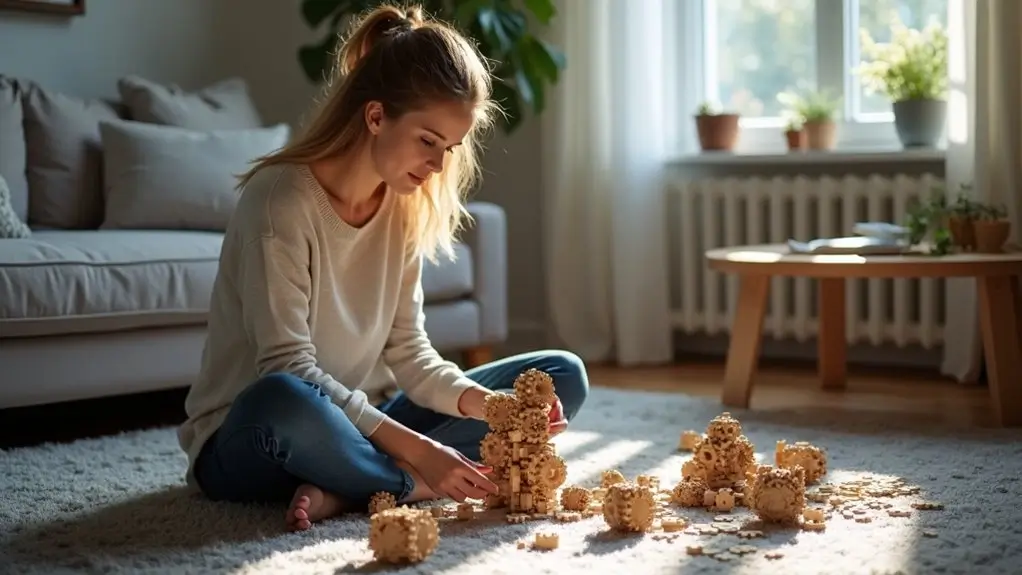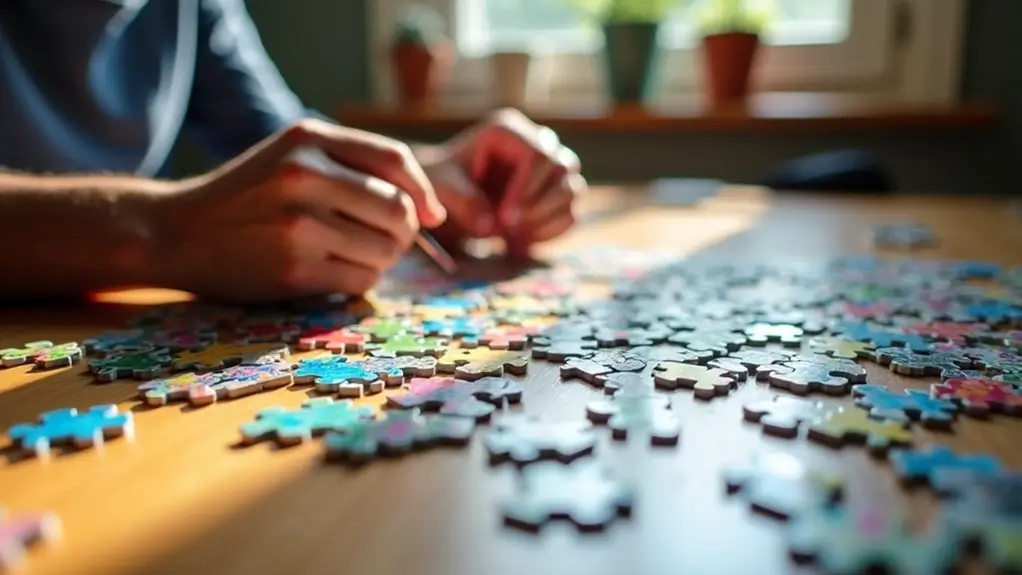
Are Puzzles Good for ADHD Adults? Exploring the Joyful Benefits
If you have been diagnosed with ADHD as an adult, adding puzzles to your daily routine can be helpful. Puzzles serve as effective cognitive exercises. They can strengthen your attention span, working memory, and problem-solving abilities.
From crosswords to jigsaw puzzles, these activities offer structured challenges that support ADHD management strategies. Knowing how different puzzles affect your brain will help you pick the best options for your needs.
Key Takeaways
- Research shows that puzzles improve focus and attention span in adults with ADHD.
- Puzzle-solving triggers dopamine release. It provides natural rewards that help maintain attention and motivation.
- Puzzles are a therapeutic tool for reducing anxiety and restlessness. They also strengthen problem-solving abilities in daily routines.
- Jigsaws are great for visual-spatial skills, crosswords for memory, and Sudoku for pattern recognition.
Understanding ADHD in Adults

ADHD is a neurological condition. It affects your brain's ability to regulate attention, impulses, and activity levels.
What Is ADHD?
Living with a neurodevelopmental disorder can present unique challenges. This is especially true for adults with attention deficit hyperactivity disorder (ADHD).
ADHD symptoms include ongoing issues with inattention, hyperactivity, and impulsivity that impact daily life and relationships.
ADHD affects approximately 4.4% of adults in the United States, though many remain undiagnosed.
The condition can appear as trouble with organization, time management, and staying focused on tasks.
It's important to recognize that adults with ADHD often face related issues. These issues include anxiety and depression. Such challenges can make managing their mental well-being more difficult.
Common Symptoms of ADHD in Adults
When managing daily life with ADHD, you'll encounter several distinctive symptoms.
- You might struggle to maintain focus during tasks. This makes it challenging to meet deadlines and stay organized.
- Impulsivity often leads to quick decisions without considering consequences.
- Restlessness creates an ongoing need for activity and stimulation.
- You may struggle to prioritize tasks and feel easily frustrated when encountering challenges.
- Managing your emotions can be challenging. Because ADHD affects your ability to regulate responses to everyday situations.
Challenges Faced by Adults with ADHD
Navigating daily life with attention and focus challenges can pose major obstacles for adults with ADHD symptoms.
Impaired executive functions can significantly affect your ability to organize tasks. They also impact your ability to manage time effectively. As a result, meeting deadlines in both professional and personal settings becomes more challenging.
The constant struggle to maintain focus can lead to heightened stress levels. This affects your emotional regulation and decision-making abilities.
You might experience difficulties in advancing your career or maintaining relationships.
Without effective management strategies, these symptoms can lead to a cycle of missed opportunities. They can also create overwhelming responsibilities, significantly affecting your daily life.
Are Puzzles Good for ADHD Adults?

When you engage with puzzles, you activate various cognitive functions that support mental health and focus.
How Puzzles Stimulate Cognitive Function?
Engaging in puzzle-solving activities stimulates multiple cognitive functions. They're particularly beneficial for adults with ADHD.
When you work on puzzles, you activate both sides of your brain. This strengthens neural pathways that support problem-solving abilities and mental agility.
Your spatial reasoning and visual discrimination skills improve as you analyze puzzle pieces and patterns.
This enhanced cognitive processing helps you manage daily tasks more effectively, boosting your attention to detail.
You'll notice improvements in your memory retention and logical thinking. These improvements directly transfer to work and academic situations.
These cognitive benefits make puzzles an excellent tool for managing ADHD symptoms.
Benefits of Problem-Solving Activities
The mental health benefits of puzzle-solving activities extend far beyond basic cognitive enhancement.
Regularly engaging with puzzles improves your attention span and ability to focus on detailed tasks. Puzzles provide structured chances for your brain to practice sustained concentration. This is especially helpful in managing ADHD symptoms.
These problem-solving activities trigger dopamine release in your brain. This provides natural rewards that encourage continued engagement.
Consistent puzzle work helps you develop better organizational skills and planning abilities. The satisfaction of finishing challenges also boosts your self-confidence and perseverance in handling daily tasks.
Puzzles and Focus: A Connection
There is a powerful connection between puzzle-solving and improved focus. When you engage with puzzles regularly, you train your brain to maintain attention for longer. This directly enhances your ability to concentrate on daily tasks.
Puzzles act as a practical tool to strengthen your cognitive skills while reducing distractibility. As you work through each challenge, you'll develop better attention to detail.
This focused state becomes more accessible over time. It helps you manage ADHD symptoms more effectively. The structured nature of puzzles enhances focus while lowering stress and anxiety.
Types of Puzzles for Adults with ADHD
When looking for puzzles that help manage ADHD, you'll find several practical options. These options cater to different cognitive needs and preferences.
Jigsaw Puzzles
Jigsaw puzzles stand out as powerful tools for adults with ADHD. They can naturally promote sustained attention and cognitive engagement.
These puzzles can reduce stress while activating both brain hemispheres. This enhances your problem-solving abilities and visual-spatial reasoning.
You'll find various complexity levels, themes, and colours to match your interests. This makes it easier to stay motivated.
As you complete the puzzle pieces, you develop skills like pattern recognition and persistence.
The satisfaction of finishing a jigsaw puzzle boosts your self-esteem. Meanwhile, the calming effect of the activity helps manage anxiety.
Crossword Puzzles
Crossword puzzles offer unique cognitive benefits for adults with ADHD. They combine language skills with strategic thinking.
You actively strengthen cognitive abilities as you work with clues and fill in answers. This includes enhancing vocabulary, improving comprehension, and developing problem-solving skills.
The structured format of crossword puzzles helps you develop organizational skills. You navigate through numbered clues and interconnected words, which supports this development.
Regular crossword practice can reduce stress and anxiety while improving your concentration. The soothing satisfaction of completing each puzzle boosts your confidence and motivation. This makes crosswords an effective tool for managing ADHD symptoms.
Sudoku and Logic Puzzles
Sudoku and logic puzzles provide powerful cognitive benefits through their systematic approach to problem-solving.
These puzzles engage your brain's pattern recognition abilities. They need to focus their attention on completing each section methodically.
When you work on these puzzles regularly, you'll improve your attention to detail. You'll also strengthen your working memory as you juggle many pieces of information.
The immediate feedback from checking solutions helps maintain motivation and focus.
Additionally, the organized nature of these puzzles creates a calming, meditative state. It can reduce stress levels while enhancing your planning and organizational skills.
Evidence Supporting Puzzles for ADHD Adults
Scientific research strongly validates puzzles as an effective tool for managing ADHD symptoms.
Research Studies on Puzzles and ADHD
Recent research shows strong evidence that puzzle-solving activities offer significant cognitive benefits for adults with ADHD.
Studies show that puzzles can serve as practical tools for developing better focus and attention span. This leads to improved task completion rates. Regularly engaging with puzzles is linked to improved memory function and visual discrimination skills.
Consistently solving puzzles can lead to lower anxiety levels and better mental processing.
Scientists have found that puzzle activities can trigger hyperfocus in adults with ADHD. This can lead to deeper engagement with tasks and greater productivity in daily activities.
Testimonials from Individuals with ADHD
Personal experiences from adults with ADHD offer strong evidence of the positive effects of puzzle-solving activities.
Many individuals report significant improvements in their ability to focus during daily tasks after regular puzzle engagement.
Puzzle-solving creates a calming environment. This helps them redirect scattered thoughts into productive mental activity.
The sense of achievement from finishing puzzles motivates continued participation. Meanwhile, regular sessions improve memory and attention to detail.
Tips for Incorporating Puzzles into Daily Life
To add puzzles to your daily routine, you'll need to create a dedicated puzzle area.
Set Realistic Goals
Establishing realistic goals creates a foundation for long-term puzzle success and engagement.
Setting realistic goals means starting with simple puzzles that match your current ability level. As your skills improve, you can gradually increase the complexity of the puzzles.
Break larger puzzle projects into manageable sections. This setting of specific milestones boosts your confidence along the way.
Start by dedicating 15-20 minutes daily to puzzle activities in a quiet space. Then, adjust the duration based on your progress.
Track your achievements and celebrate small victories. This will support you as you work toward more challenging puzzle types.
Create a Puzzle-Friendly Environment
The right environment also plays a key role in making puzzle activities successful.
Create a dedicated puzzle zone in your home. This space will allow you to focus on the task without interruptions. Consider using a puzzle board or mat to keep pieces organized and accessible.
Set aside consistent daily time slots for puzzle activities. Enhance your environment with calming background sounds for relaxation.
It's easier to concentrate when you've established a designated space and routine. Choose puzzles that match your interests and abilities to maintain engagement.
Balance Puzzle Time with Other Activities
Successfully adding puzzles to your daily routine requires a careful balance with other activities.
You'll benefit from establishing dedicated puzzle-solving sessions of 10 to 15 minutes. Rotate these sessions with physical exercise and creative pursuits for optimal results.
Using timers helps create structured intervals for focused puzzle work. This should be followed by essential breaks that prevent mental fatigue.
Consider joining puzzle groups or engaging with family members. This combines cognitive stimulation with social interaction.
Keep various puzzle types available to match your fluctuating attention levels and interests throughout the week. Alternate between different difficulty levels and formats.
Conclusion
Puzzles are a valuable tool for managing adult ADHD symptoms. Adding puzzles to your daily routine supports better focus, problem-solving skills, and mental clarity.
Whether you opt for crosswords, jigsaw puzzles, or logic games, you invest in a proven strategy. This approach can help reduce ADHD symptoms while providing engaging mental stimulation.
FAQs
Do People With ADHD Do Well With Puzzles?
Yes. Puzzles can enhance the focus and cognitive skills of people with ADHD. They're great for engaging the hyperfocus trait and providing a sense of accomplishment.
What Are the Best Puzzles for ADHD?
Start with simpler jigsaw puzzles, colorful 3D puzzles, or interactive puzzle games. Pick themes you enjoy and begin with shorter completion times.
What Are People With ADHD Usually Good At?
They often excel at creative thinking, problem-solving, and visual-spatial tasks. Their high energy and ability to hyperfocus can make them exceptional at dynamic activities.